From the Senate Office: SEC Agenda
The following agenda is published in accordance with the Faculty Senate Rules. Any member of the standing faculty may attend SEC meetings and observe. Questions may be directed to Patrick Walsh, executive assistant to the Senate Office, either by telephone at (215) 898-6943 or by email at senate@pobox.upenn.edu
Faculty Senate Executive Committee Agenda
Wednesday, November 28, 2018
3-5 p.m.
Glandt Forum, Singh Center for Nanotechnology, 3205 Walnut St., 3rd Floor
1. Update from the Office of the President (45 minutes)
Discussion with President Amy Gutmann
2. Approval of the Minutes of October 31, 2018 (1 minute)
3. Chair’s Report (10 minutes)
4. Past-Chair’s Report (4 minutes)
5. Update from the Office of the Executive Vice President (45 minutes)
Discussion with Executive Vice President Craig Carnaroli, Vice President for Budget and Management Analysis Trevor Lewis and Vice President for Facilities and Real Estate Services Anne Papageorge
6. New Business (5 minutes)
State of the University: Strategic Framework for Global Initiatives, 2018-2023
At the University Council meeting on October 24, the annual State of the University presentations were made. The President’s portion was introduced by President Amy Gutmann and then given by John Zeller, senior vice president of Development and Alumni Relations, who spoke about the current Power of Penn Campaign; see Almanac October 30, 2018. The Provost’s portion was introduced by Provost Wendell Pritchett and given by Zeke Emanuel, Vice Provost for Global Initiatives, who talked about Three Pillars for Global Engagement. His portion is below.
Ezekiel (Zeke) Emanuel, Vice Provost for Global Initiatives
Soon after I became Vice Provost for Global Initiatives in September 2011, we did two things. One was to take an assessment of what the University was doing globally. There was a lot of information about global activities in different pots as well as a lot of places where we simply didn’t have information about our global reach but wished we did. After that collection process, we talked to the community and developed the three pillars of our initial, five-year Strategic Plan: preparing students for a globalized society, strengthening Penn as a global agenda setter and promoting healthy and inspiring productive lives.
That plan was intended to guide us through 2018 and so, as it approached the end of its five-year length, we reassessed where we were and have worked with the community and talked to many of you around the table about where we should go. The result is a new Strategic Framework for Global Initiatives, which has three new pillars. The first is educating global citizens; the second is catalyzing transformative ideas; and the third is bringing the world to Penn and Penn to the world.
I want to talk about each one of these pillars in a little more detail. What we have done in this Strategic Plan that is a little different from the previous one is to identify priority areas for achieving each of the goals, and we have also identified some stretch goals.
Pillar #1: To understand the first pillar, we have a bold statement: Penn is committed to providing a meaningful global experience to every single Penn student. I think this is a pretty ambitious goal, and we really intend to do it. Now, that global experience does not necessarily have to be overseas—there are a lot of things you can do in the global sphere right here in Philadelphia. But we would like to have all Penn students who leave the University be comfortable in the world; competent to engage people, cultures and ideas from around the globe; and be curious. Because we all know that four years of Penn is a great education, but what it really prepares you for is a life of learning. The key to that life of learning is being curious about the rest of the world and people in other parts of the world. Those would be the three “C’s” to guide our mission.
One particular goal we have is to offer a full complement of semester- and year-long study abroad opportunities. One way of seeing what we want here in terms of this first pillar is that from the moment you get the Penn admissions packet to long after you graduate, we have global experiences available for you as students. One of the things we learned through our first five-year Strategic Plan is that we needed to add study abroad opportunities beyond the conventional semester and year-long study-abroad opportunities because for a lot of students—if they are involved in sports, the newspaper, theater, or lots of other programs—it’s hard to get away for a whole semester or year.
Another goal is to expand and diversify our Penn Global Seminars. These are courses that have a global component built into a regular semester-long course here at Penn. We are up to 12 this year—but we really want to expand that number. Beyond that, we are strengthening and expanding our Global Research and Internship Program by supplementing our existing summer internship placements at non-profits abroad with placements at for-profit companies and research institutions around the globe. We have long had a major initiative through the Center for Undergraduate Research and Fellowships to get students to do research with our own faculty, but with so many great research institutes around the globe, we are eager to send students to the likes of the Pasteur Institute, the Karolinska and the Weizmann. We want to provide students with research experience and a global experience at once, particularly by developing May-term and summer programs so that more students can go overseas during their tenure at Penn. So those are our priority areas and I am happy to say we are firing on all cylinders for those programs.
Then we also have ambitions to support innovative global projects in post-graduate opportunities. There is obviously the President’s Engagement Prize, which has been quite successful in the global space. There are competitive fellowship programs, and we want to encourage more students to apply to these fellowships. We want to support school-based short-term abroad programs. Schools that have very rigid course requirements like Engineering have been talking to us about how to integrate global experiences right into their curriculum so that their students—even though they have a pre-specified four years—can have those available. The last goal is to explore gap-year programs and begin developing more services for students who take gap years.
We also have a number of curricular and extracurricular programs that we are trying to enhance. Perry World House, as the Provost mentioned, has opened and is thriving. It has a full range of programs and we hope to enhance and expand those programs. That includes the World House student fellowship programs, initially begun at the undergraduate level and expanded to the graduate level. We also have a goal to roster courses to be taught by Perry World House faculty, visiting scholars and policymakers. This expands the opportunities students have to learn with people who are actually engaged in the world, setting policy and pushing the world in various ways. We also want to develop undergraduate academic programs, partnerships with schools and departments, certificates, minors and other activities, as well as thinking about additional add-on campus activities. We already have Penn Global Week, but we are thinking about ways to expand that kind of programming beyond a single week.
We also want to integrate travel components with globally oriented majors and minors. In the Penn Global Seminars, we include travel components into courses, and now, whether it’s international relations or political science or history or literature, we can imagine travel components to those majors and try to get them to be more integral. Then we want to develop global competency programs with the humanities and language programs—there are Penn programs like the Huntsman program that have language requirements and get students overseas. We think those kinds of very positive experiences should be expanded to other majors and not limited to the Huntsman Program.
Some of our ambitions are to create a campus-wide global citizenship curriculum, integrated with the Penn Reading Project and other things that Penn already uses, as well as support programs to connect immigrant populations in Philadelphia with more Penn students.
Pillar #2: The second pillar is to catalyze transformative ideas. We have created a series of institutions in the time that I have been here—the Penn Wharton China Center, the Biden Center and the Perry World House. We really need to begin to utilize all of them to develop the next generation of transformative ideas on the global stage. So we have this idea that will bring leading global scholars and practitioners to engage in the University community and generate transformative ideas on the major global challenges. This includes convening theme-specific networks led by Penn scholars and experts to generate academic knowledge and catalyze, debate and develop innovative, well-vetted proposals on critical global challenges.
In the realm of transformative ideas, we want to be very future-
oriented. We want Penn to become a leading institution on the future of China in the world, for example, through the combined efforts of the Perry World House with our Penn Wharton China Center and other centers on campus. We must also consider the future of the global order—global institutions such as the European Union and the World Trade Organization face big challenges. How will they meet them and how can we help define that future?
We also want to build Penn’s institutions that engage internal and external thought leaders. We want Perry World House to become a unique incubator for ideas: the place where global thought leaders come to develop their ideas in conjunction with our faculty.
Additionally, we want to strengthen connections between the Penn Biden Center and campus to disseminate our ideas to policymakers in Washington and beyond. It’s a critical bridge. The Biden Center is a beautiful space, a great convening space and it has links to Washington-based global policymakers.
We also need to provide support for school-based, faculty-led research initiatives around the world. We’ve got focuses in China and India. In both cases, we’ve created research and engagement funds where the Provost Office supports faculty doing projects. We’ve really expanded those and are using them to catalyze some great ideas. With other countries, we have a global engagement fund to support faculty doing novel research.
Pillar #3: The third pillar is to bring the world to Penn and Penn to the world. Currently, 15% of our undergraduate student body comes from countries outside the United States. We really are bringing the world to Penn. When we send our students overseas, we are bringing Penn to the world. We want to further this. We want to educate the leading international students, enhance institutional services both for students and faculty engaged in global activities, and elevate our presence by strengthening the constellation of centers and institutes that engage in global work. We want to ensure international student success and opportunities for global engagement. A few years ago, we began doing much more to integrate global students into the Penn community. Your job is to help us think through how we can do this.
Part of it is, when students arrive here from other countries, we must help get them more integrated. We now have a full set of sessions at orientation for them. Part of the campaign is to raise additional money for scholarships for students when they come from overseas so we ensure diversity in the international student population. We want to enhance the services for all students once they’re at Penn by creating one-stop global services center for Penn faculty, students and post-doctoral scholars to facilitate all their global activities. People shouldn’t have to figure out how to navigate the maze that is Penn. We want to help people so that they have one number to call, whether it’s related to visas, scholarship opportunities, grant funding or the security situation in a country.
We want to provide guidance and support for faculty on global fellowships, where they can actually get support for their work and develop tools and resources to assist schools who want to link up with other schools and develop new educational or research-related programs. There’s a whole series of activities and our ambitions are to develop more of our programs and take them to the next level, so that they really are the best-in-category programs in the entire country.
Lastly, we want to better engage other educational institutions, corporations, governments and non-governmental organizations. We want to make sure that ideas generated at Penn and people at Penn can connect more broadly and have greater impact and influence on the global stage. We have a number of metrics we’re going to be looking at for success, and I’m sure these metrics will evolve as our understanding of these programs deepens. So, that’s the program. We have a few questions, but I’d mostly be interested in answering your questions.
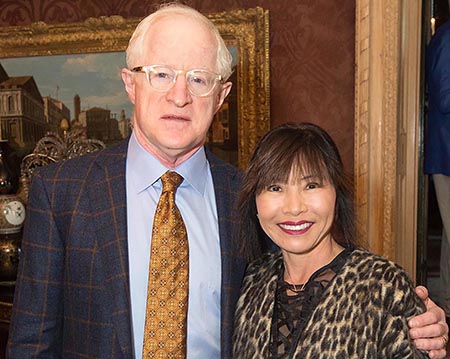 The University of Pennsylvania School of Design has received a $1.25 million gift from William Witte (C’73, MCP’75) and his wife, Keiko Sakamoto, Esq., to establish an annual prize for an outstanding planning student at PennDesign, along with a professional award for innovation and impact in planning.
The University of Pennsylvania School of Design has received a $1.25 million gift from William Witte (C’73, MCP’75) and his wife, Keiko Sakamoto, Esq., to establish an annual prize for an outstanding planning student at PennDesign, along with a professional award for innovation and impact in planning.
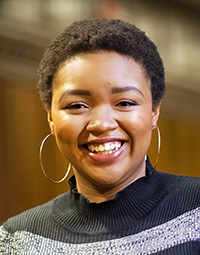 University of Pennsylvania senior Anea Moore has been awarded a Rhodes Scholarship for graduate study at the University of Oxford, the oldest university in the English-speaking world. Considered one of the most prestigious academic honors, the Rhodes is highly competitive.
University of Pennsylvania senior Anea Moore has been awarded a Rhodes Scholarship for graduate study at the University of Oxford, the oldest university in the English-speaking world. Considered one of the most prestigious academic honors, the Rhodes is highly competitive. 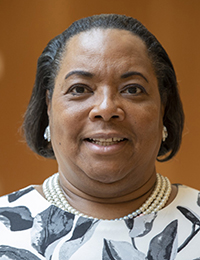 Tamara L. Greenfield King has been named Associate Vice Provost for Student Affairs in the Division of the Vice Provost for University Life. Ms. King comes to Penn from Washington University in St. Louis, where she serves as Associate Vice Chancellor for Student Support and Wellness for undergraduate, graduate and professional students. She will start at Penn in January 2019.
Tamara L. Greenfield King has been named Associate Vice Provost for Student Affairs in the Division of the Vice Provost for University Life. Ms. King comes to Penn from Washington University in St. Louis, where she serves as Associate Vice Chancellor for Student Support and Wellness for undergraduate, graduate and professional students. She will start at Penn in January 2019.-resized.jpg) Robert P. Levy (C’52), Emeritus Trustee and a decorated Philadelphia sportsman who spent decades mentoring young people at Penn and beyond through athletics, died on November 7. He was 87.
Robert P. Levy (C’52), Emeritus Trustee and a decorated Philadelphia sportsman who spent decades mentoring young people at Penn and beyond through athletics, died on November 7. He was 87.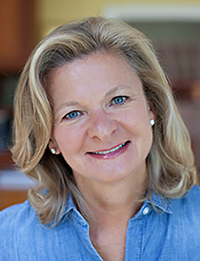 Award-winning, best-selling novelist Lisa Scottoline received the 2018 Creative Spirit Award for her lifelong commitment to and excellence in the arts. A member of the undergraduate Class of 1976 and a 1981 graduate of Penn Law, Ms. Scottoline began her career as a litigator and later picked up her pen full time.
Award-winning, best-selling novelist Lisa Scottoline received the 2018 Creative Spirit Award for her lifelong commitment to and excellence in the arts. A member of the undergraduate Class of 1976 and a 1981 graduate of Penn Law, Ms. Scottoline began her career as a litigator and later picked up her pen full time.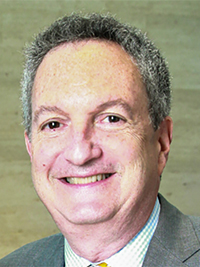 Allan C. Bell, Class of 1981, is a Penn basketball fan alongside his family members and fellow alumni: wife Dale Borenstein Bell, daughter Brittany and son Brandon. Active on a number of boards at Penn, he served on the committees on Student Life and Local, National and Global Engagement as a member of the Board of Trustees (2013-2017); as a member of the Penn Alumni Board of Directors and the Basketball Board; the Penn Fund Executive Committee; and, with his wife, the Penn Hillel Board of Overseers. He has inspired philanthropy and alumni engagement through leadership roles as the co-chair of the Class of 1981 Gift Committee, as a member and president of the Alumni Class Leadership Council and currently as chair of the Alumni Engagement Committee of The Power of Penn Campaign. He and Dale marked their 25th class reunion by creating the Allan & Dale B. Bell Family Endowment Scholarship in memory of his father, Harold Bell.
Allan C. Bell, Class of 1981, is a Penn basketball fan alongside his family members and fellow alumni: wife Dale Borenstein Bell, daughter Brittany and son Brandon. Active on a number of boards at Penn, he served on the committees on Student Life and Local, National and Global Engagement as a member of the Board of Trustees (2013-2017); as a member of the Penn Alumni Board of Directors and the Basketball Board; the Penn Fund Executive Committee; and, with his wife, the Penn Hillel Board of Overseers. He has inspired philanthropy and alumni engagement through leadership roles as the co-chair of the Class of 1981 Gift Committee, as a member and president of the Alumni Class Leadership Council and currently as chair of the Alumni Engagement Committee of The Power of Penn Campaign. He and Dale marked their 25th class reunion by creating the Allan & Dale B. Bell Family Endowment Scholarship in memory of his father, Harold Bell.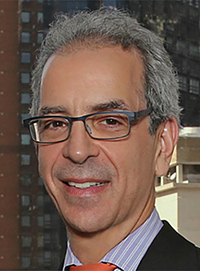 Mitchell J. Blutt holds three degrees from Penn. As a member of the Class of 1978, he designed his own multidisciplinary undergraduate major that combined psychology, biology, anthropology and statistics. He then went on to earn an MD from the Perelman School of Medicine and an MBA from the Wharton School, becoming one of the Penn’s first physicians to develop a hybrid career with a prominent role on Wall Street. He has provided leadership serving on Penn’s Board of Trustees, on the School of Arts and Sciences’ Board of Overseers and as a member of the Penn Medicine Board of Trustees. His philanthropy includes scholarships at the School of Arts and Sciences, the Mitchell J. Blutt Visiting Professorship in Entrepreneurism and Medicine and the endowment of the Perelman School’s first MD/MBA scholarship fund. He has also endowed Mitchell J. Blutt and Margo Krody Blutt Presidential Professorships at the School of Arts and Sciences, Perelman and Wharton. Following a passion for music, he also made gifts supporting the Blutt College House Music Program, the Blutt Band Slam Homecoming event and the Blutt Singer Songwriter Symposium.
Mitchell J. Blutt holds three degrees from Penn. As a member of the Class of 1978, he designed his own multidisciplinary undergraduate major that combined psychology, biology, anthropology and statistics. He then went on to earn an MD from the Perelman School of Medicine and an MBA from the Wharton School, becoming one of the Penn’s first physicians to develop a hybrid career with a prominent role on Wall Street. He has provided leadership serving on Penn’s Board of Trustees, on the School of Arts and Sciences’ Board of Overseers and as a member of the Penn Medicine Board of Trustees. His philanthropy includes scholarships at the School of Arts and Sciences, the Mitchell J. Blutt Visiting Professorship in Entrepreneurism and Medicine and the endowment of the Perelman School’s first MD/MBA scholarship fund. He has also endowed Mitchell J. Blutt and Margo Krody Blutt Presidential Professorships at the School of Arts and Sciences, Perelman and Wharton. Following a passion for music, he also made gifts supporting the Blutt College House Music Program, the Blutt Band Slam Homecoming event and the Blutt Singer Songwriter Symposium.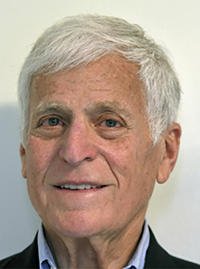 Louis Kozloff, a member of the Class of 1965 and a 1969 alumnus of the Perelman School of Medicine, has deep roots at Penn. He has 40 Penn alumni in the family, including wife Rene Chalfin Kozloff, daughter Laurie and son Howard. A basketball player and swimming standout at Penn, he and his father, Henry Kozloff, also an alumnus of the College and School of Medicine, share the distinction of being one of only two father-son pairings in the Penn Athletics Hall of Fame. He has taken part in his medical school reunion committees since 1979, and in 1990 he joined the Medical Alumni Advisory Council, chairing it from 2012 to 2015. As a major benefactor of the Class of 1969 Scholarship Fund, and as a leader in establishing the Edward T. Anderson, C’65, M’69 –Louis Kozloff, C’65, M’69 Scholarship Fund and the Anderson Kozloff Thompson Classroom in the Jordan Medical Education Center, he received the School of Medicine Alumni Service Award in 2011. He also serves on the Swimming Sports Board and helped support the Kozloff Family Room in the Tse Ping-Cheng Cheung Ling Sports Center.
Louis Kozloff, a member of the Class of 1965 and a 1969 alumnus of the Perelman School of Medicine, has deep roots at Penn. He has 40 Penn alumni in the family, including wife Rene Chalfin Kozloff, daughter Laurie and son Howard. A basketball player and swimming standout at Penn, he and his father, Henry Kozloff, also an alumnus of the College and School of Medicine, share the distinction of being one of only two father-son pairings in the Penn Athletics Hall of Fame. He has taken part in his medical school reunion committees since 1979, and in 1990 he joined the Medical Alumni Advisory Council, chairing it from 2012 to 2015. As a major benefactor of the Class of 1969 Scholarship Fund, and as a leader in establishing the Edward T. Anderson, C’65, M’69 –Louis Kozloff, C’65, M’69 Scholarship Fund and the Anderson Kozloff Thompson Classroom in the Jordan Medical Education Center, he received the School of Medicine Alumni Service Award in 2011. He also serves on the Swimming Sports Board and helped support the Kozloff Family Room in the Tse Ping-Cheng Cheung Ling Sports Center. 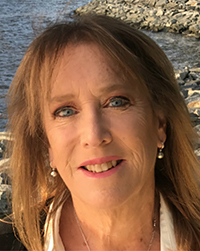 Cindy Shmerler Levy, Class of 1981, also has deep Quaker family ties. The daughter of the late alumnus Edwin Shmerler, she is married to alumnus Ford Levy and the mother of alumni Kristen Levy and Maxwell Levy. Her time at Penn, as an English major and a member of the Varsity Tennis and Squash teams, laid the foundation for her life as a tennis journalist and television commentator. Her work has appeared in such outlets as The New York Times, The Boston Globe and on ESPN. For more than 20 years, she has helped transform the Penn Club of Westchester & Rockland Counties, serving as president for a decade and vice president previously. She is also active on the Penn Alumni Board of Directors and in the Trustees’ Council of Penn Women on the Committee for Athletics and the Communications Committee. Her support to Penn includes a gift establishing the Paula Shmerler Endowed Fund for Alzheimer’s Research, honoring her mother.
Cindy Shmerler Levy, Class of 1981, also has deep Quaker family ties. The daughter of the late alumnus Edwin Shmerler, she is married to alumnus Ford Levy and the mother of alumni Kristen Levy and Maxwell Levy. Her time at Penn, as an English major and a member of the Varsity Tennis and Squash teams, laid the foundation for her life as a tennis journalist and television commentator. Her work has appeared in such outlets as The New York Times, The Boston Globe and on ESPN. For more than 20 years, she has helped transform the Penn Club of Westchester & Rockland Counties, serving as president for a decade and vice president previously. She is also active on the Penn Alumni Board of Directors and in the Trustees’ Council of Penn Women on the Committee for Athletics and the Communications Committee. Her support to Penn includes a gift establishing the Paula Shmerler Endowed Fund for Alzheimer’s Research, honoring her mother.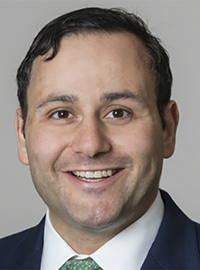 The Class of 2006’s Austin Leo Lavin began his career as an entrepreneur and connector in Philadelphia, where he launched the start-up
The Class of 2006’s Austin Leo Lavin began his career as an entrepreneur and connector in Philadelphia, where he launched the start-up 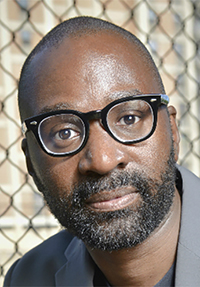 This year’s Faculty Award of Merit went to Dean John Jackson, Jr., of the School of Social Policy & Practice. Dean Jackson is the Richard Perry University Professor, with appointments in the Annenberg School for Communication, School of Arts & Sciences and School of Social Policy & Practice. His research involves ethnographic methods in media analysis, the impact of mass media on urban life, mediamaking as a form of community-building and proselytizing among religious organizations, globalization and the remaking of ethnic/racial diasporas, visual studies and theories of reality,and racialization and media technology. On January 1, he will assume his new role as dean of the Annenberg School for Communication.
This year’s Faculty Award of Merit went to Dean John Jackson, Jr., of the School of Social Policy & Practice. Dean Jackson is the Richard Perry University Professor, with appointments in the Annenberg School for Communication, School of Arts & Sciences and School of Social Policy & Practice. His research involves ethnographic methods in media analysis, the impact of mass media on urban life, mediamaking as a form of community-building and proselytizing among religious organizations, globalization and the remaking of ethnic/racial diasporas, visual studies and theories of reality,and racialization and media technology. On January 1, he will assume his new role as dean of the Annenberg School for Communication.


